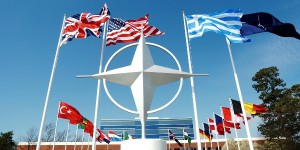 The United States and Britain set the tone Thursday for a NATO summit, calling on the alliance to stand up to Russia over Ukraine and to be ready to confront Islamic State extremists.
The United States and Britain set the tone Thursday for a NATO summit, calling on the alliance to stand up to Russia over Ukraine and to be ready to confront Islamic State extremists.Ukraine will dominate what is seen as the most important NATO summit since the end of the Cold War but the 28 leaders must also tackle the new threats posed by Islamic State in Iraq and Syria, and oversee a troubled withdrawal from Afghanistan.
"We will take important steps to counter these threats," NATO secretary general Anders Fogh Rasmussen told reporters as he arrived for two days of talks at a hotel under security lockdown in Newport in Britain.
There can be no shirking the new challenges, US President Barack Obama and British Prime Minister David Cameron warned in a joint statement in The Times newspaper on Thursday.
They vowed to "confront" Islamist radicals in Iraq and Syria and said they would not be "cowed" following the beheading of two US journalists.
They were equally trenchant over Ukraine.
"Russia has ripped up the rulebook with its illegal, self-declared annexation of Crimea and its troops on Ukrainian soil threatening and undermining a sovereign nation state," they said ahead of the summit opening in Wales.
In response, NATO -- set up in 1949 to defend Western Europe against the Soviet Union -- should "support Ukraine's right to determine its own democratic future and continue our efforts to enhance Ukrainian capabilities," they said.
NATO should build a "persistent" presence in Eastern Europe to reassure nervous allies there, they said, referring to plans expected to be approved at the summit for a new, rapid response force.
To do that, member states will have to cough up more money -- a sore point in Washington which accounts for some 75 percent of all alliance military spending -- so as to demonstrate "our collective resolve is as strong as ever."
- Ukraine fighting rages -
In Ukraine meanwhile, Kiev reported continued "active combat operations" in the east, with "more than 100 militants" killed, while in Donetsk, the centre of pro-Russian rebel resistance, local authorities said the situation was tense after heavy shelling early Thursday.
In a high-profile gesture of support for Kiev, NATO leaders will meet Ukrainian President Petro Poroshenko for a session of the NATO-Ukraine Council, set up after the country became an alliance partner in 1997.
Cameron will also meet Poroshenko separately with his peers from France, Germany, Italy and the United States just before the official opening of the summit at 1045 GMT.
- Putin peace plan -
For his part, Russian President Vladimir Putin stole a march on the summit Wednesday, unveiling a peace plan which he said would produce a ceasefire on Friday, the same day the European Union is expected to announce additional tough economic sanctions against Moscow.
Poroshenko said the plan was agreed earlier during a telephone call with Putin but his prime minister, Arseniy Yatsenyuk, rejected it as just the latest "attempt to pull the wool over the eyes of the international community" ahead of the summit and the EU sanctions decisions.
Rasmussen has warned repeatedly that Russian intervention in Ukraine is the most serious security threat to Europe since the Cold War, one which the 28 member states ignore at their peril.
The new rapid response force, a "spearhead," will be "a more visible NATO presence in the East for as long as required," Rasmussen said.
Crucially, such elements will be rotated through eastern Europe, not based there permanently, to remain in compliance with a key clause in the 1997 NATO-Russia Founding Act which fixed Europe's post-Cold War borders and prohibited the use of force to change them.
On that count, NATO says Russia's March annexation of Crimea territory is in breach of the Founding Act, stoking speculation the treaty could be revoked.
If it were to be abandoned, however, the uncertainties that many thought settled after the end of the Cold War could well be re-opened, an unsettling prospect for the West.
NATO offered Ukraine full membership in 2008, when Russia went to war against another former Soviet state, Georgia, but in 2010 then president Viktor Yanukovych opted for a "non-bloc" policy.
Yatsenyuk said last week, however, he would ask parliament to endorse a membership bid, a move certain to infuriate Russia which resents NATO's presence in the former Soviet states of eastern Europe.
- Mistral sale suspended -
The Ukraine crisis is putting the alliance under other strains.
On Wednesday, a French diplomatic source said Wednesday that Paris had suspended delivery of the first of two warships to Russia in response to "pressure" from its allies who believe the sale sends completely the wrong signal to Moscow.
NATO meanwhile faces another quandary in Afghanistan, where the alliance is due to end its longest ever combat operation this year, but finds it has no government to hand over to as presidential elections have failed to produce a winner.
By AFP
The Iran Project is not responsible for the content of quoted articles.










